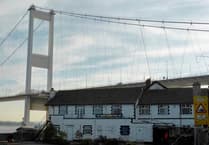Being brought up in the north east of England, I had no knowledge of the Forest of Dean except as a patch of black on maps of England, signifying coal mining in a remote unknown area.
But when I was a student at the University of London, on visits to this area with friends with West Country connections, I discovered the Forest of Dean. These friends introduced me to the narrow mysterious lanes around Wollaston and the commons of Aylburton and Alveston, leading up to St Briavels. I drank real ale outside the ancient George pub and watched Morris dancers performing there, in this historic area overlooked by a mediaeval moated castle with views of the forest and the winding River Wye far below. It struck me as being an idyllic rural paradise.
A few years later, I was invited by one of my college friends to attend an auction in St Briavels for an old cottage in Crown Lane, the narrow passageway that conveniently connected the George pub with the other pub in the village, the Crown, which sadly is no more. She wanted to buy the cottage at an auction in the village assembly rooms, and ‘would I bid for her?’ I agreed, and noting the maximum bid that I was allowed to make, I drove from my home in London to the village, seeing for the first time the charming old house that I was to bid for. I was captivated by the picturesque cottage in its picturesque village setting.
In the assembly rooms I was competing with a fellow bidder who took the bidding to the maximum amount that I had been allocated. I was so absorbed by the process that I recklessly bid onwards regardless, and eventually made an exorbitant bid that my adversary did not match, which won the auction but was completely beyond my resources. A moment of panic. I signed a cheque for the 10% of the winning bid as the terms of the auction required.
I was at my local bank branch in London promptly at opening time the following morning, and much to my surprise the bank manager agreed to honour the cheque for the 10% amount that I had so irresponsibly signed. The University of London, my employers at the time, again to my utter surprise, agreed to loan me the remaining 90%, as no building society would underwrite an ancient cottage which needed serious repairs (of which I had been completely unaware).
So, I became a weekend resident of St Briavels while still living in London. I would travel up each weekend on Saturday mornings to St Briavels to enjoy my weekend escape from London, returning on Sunday afternoons, but as I became more and more involved in the village and the Forest, I was making the journey from London on Friday evenings, earlier and earlier each week, and leaving St Briavels for London on Monday mornings, later and later, making my weekend forest breaks longer and longer. I considered a daily commute to London, but that was not really practical.
So I started work in Cardiff, finding a capital city that it was feasible to commute to, living (apart from a 10 year exile abroad) in various charming villages throughout the forest, avoiding any further visits to London, and celebrating with great satisfaction my incredibly reckless introduction to the Forest and my fortunate status as a naturalised Forester (work in progress).





Comments
This article has no comments yet. Be the first to leave a comment.